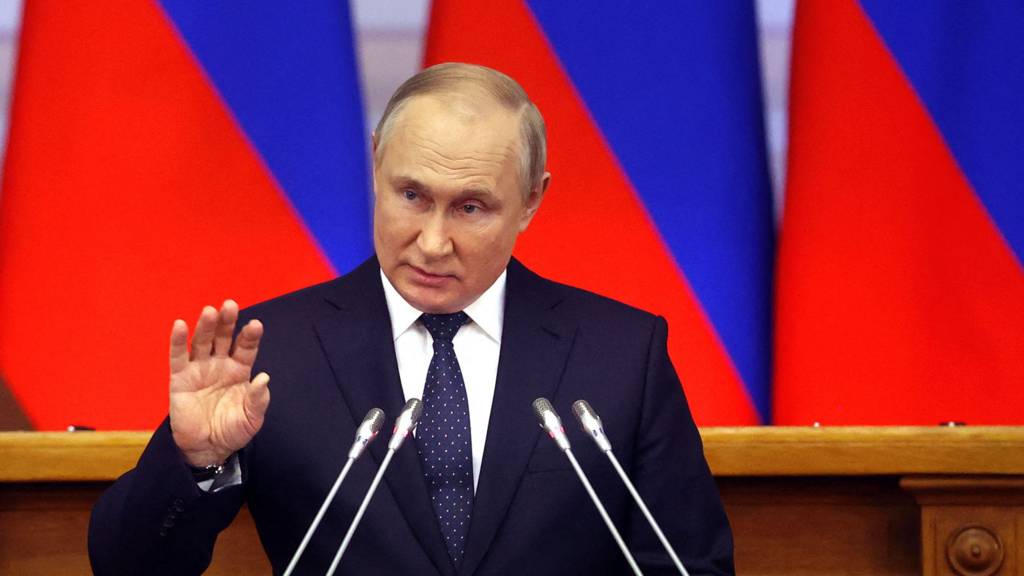
As it happened: Putin warns against 'outside intervention' in Ukraine
Updates from BBC correspondents: Yogita Limaye, Sarah Rainsford, Joe Inwood, Joel Gunter and Anna Foster in Kyiv, Andrew Harding in Donbas, Catherine Byaruhanga in Zaporizhzhia, Toby Luckhurst and Dan Johnson in Lviv and Caroline Davies in Odesa
Related Video and Audio
RTL
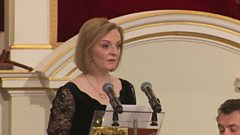
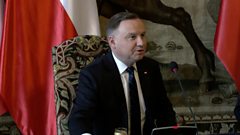

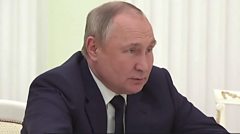
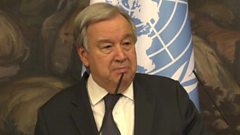
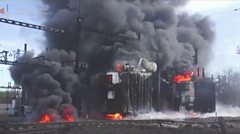
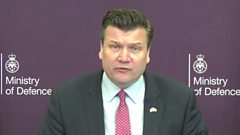

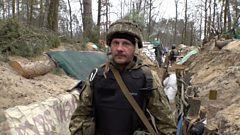
Live Reporting
Edited by Jude Sheerin
All times stated are UK
Get involved

ReutersCopyright: Reuters Ukrainian refugees from Mariupol arrive in ZaporizhzhiaImage caption: Ukrainian refugees from Mariupol arrive in Zaporizhzhia Analysis

Getty ImagesCopyright: Getty Images 
Getty ImagesCopyright: Getty Images Civilians shelter in a bunker in eastern UkraineImage caption: Civilians shelter in a bunker in eastern Ukraine 
Getty ImagesCopyright: Getty Images -
One woman was killed by Russian shelling on a hospital in the eastern city of Sievierodonetsk
-
Cluster munitions, which are banned under certain international treaties, were dropped on the village of Velyka Kostromka in the Dnipropetrovsk region
-
Russian troops fired at least 50 mortars into the Esman community in the north-eastern region of Sumy
-
In Mariupol, artworks have been removed from local museums by the Russian military after they were handed over by a Ukrainian civil servant
-
Explosions have been heard in the southern cities of Odesa and Kherson in the past few hours. In Kherson, RIA news agency said Ukraine had fired three rockets at the
centre of the Russian-occupied city but Russian forces shot down two of them
-
Russia's defence ministry says Kalibr missiles struck an arms depot in Zaporizhzhia, which it said was housing US and European weapons
-
Ukrainian military leaders say little has changed along the eastern front in the past 24 hours
-
The mayor of Kharkiv has pledged to rename everything in the city with any connection to Russia, saying he would form a committee to do so as soon as the war ends

Getty ImagesCopyright: Getty Images Kyiv's TV tower was targeted by a missile just as media companies were struck by hackers, Microsoft foundImage caption: Kyiv's TV tower was targeted by a missile just as media companies were struck by hackers, Microsoft found 


EPACopyright: EPA 

ReutersCopyright: Reuters A series of strategic locations in Russia have caught fire, including this fuel depot in BryanskImage caption: A series of strategic locations in Russia have caught fire, including this fuel depot in Bryansk 
Getty ImagesCopyright: Getty Images 
Getty ImagesCopyright: Getty Images 
Radiotelevisao Portuguesa - Servico Publico de Tel/EVNCopyright: Radiotelevisao Portuguesa - Servico Publico de Tel/EVN 
BBCCopyright: BBC 
Getty ImagesCopyright: Getty Images Analysis

Getty ImagesCopyright: Getty Images 
Getty ImagesCopyright: Getty Images Vladimir Putin (L) met António Guterres in Moscow on WednesdayImage caption: Vladimir Putin (L) met António Guterres in Moscow on Wednesday 
.Copyright: . President Zelensky said Russia sees a united Europe as a target for "political blackmail"Image caption: President Zelensky said Russia sees a united Europe as a target for "political blackmail" 
EPACopyright: EPA 
ReutersCopyright: Reuters 
Getty ImagesCopyright: Getty Images 
Getty ImagesCopyright: Getty Images 
Getty ImagesCopyright: Getty Images 

BBCCopyright: BBC 

Getty ImagesCopyright: Getty Images 
EPACopyright: EPA -
Russia's president says any outside intervention in Ukraine will be met with a "lightning-fast" response
-
Russian energy supplier Gazprom cut off gas supplies to Poland and Bulgaria, saying it was because both countries refused to pay in roubles
-
The Kremlin said other countries' gas could be cut off if they don't comply with Russia's payment demands
-
Poland and Bulgaria accused Gazprom of breaching its contracts
-
European Commission chief Ursula von der Leyen called Russia's move "an instrument of blackmail" and said paying for Russian gas in roubles is a breach of EU sanctions
-
A commander holed up with Ukrainian forces in the besieged Azovstal steel plant in Mariupol has called for a Dunkirk-like "extraction" to allow troops and civilians to leave
-
UK Foreign Secretary Liz Truss is to call for the West to provide Ukraine with fighter jets, in a speech this evening
-
287 MPs in the UK Parliament have been sanctioned by Russia for "groundless whipping up of Russophobic hysteria"
-
Finland's Europe minister, Tytti Tuppurainen, told the BBC the country would make its own decisions on joining Nato, but the war in Ukraine "changed everything"
-
The Russian-backed government of Moldova's breakaway Transnistria region accused Ukraine of firing shots into the region. But Ukrainian President Volodymyr Zelensky said Russian special services were behind attacks there
Latest PostWe're ending our live coverage here
That's it for tonight.
Our live coverage of the war in Ukraine will restart on Thursday morning Kyiv time.
Join our continuing updates here now.
Analysis: Should we be worried about a gas supply crisis?
Faisal Islam
BBC Economics Editor
How worried should we be about Gazprom's decision to halt gas exports to Poland and Bulgaria over the countries' refusal to pay for supplies in roubles?
Both Poland and Bulgaria were already planning not to renew their contracts with the Russian energy giant, which expire at the end of the year. In Poland's case, it had been filling its stores of gas ahead of time, which provides some cushion, especially as we approach the summer lull in use of gas.
This escalation is real, and justified by the Kremlin on the basis of a refusal to pay for gas by changing money into roubles in Russian bank accounts.
But the additional impact of Wednesday's news should be containable and the actions of the Kremlin through Gazprom need to be put in perspective.
Read Faisal's full analysis
Canada MPs condemn Russian 'genocide'
Canada's parliament has unanimously condemned Russia's actions in Ukraine as "genocide".
The lawmakers agreed on Wednesday that there was "clear and ample evidence of systemic and massive war crimes against humanity" by Russian troops.
The presidents of Poland and the US have both labelled Russia's killing of civilians "genocide", but other world leaders - such as the president of France - have stopped short of the term.
International law defines genocide as the deliberate “intent to destroy, in whole or in part, a national, ethnical, racial or religious group".
Last year, Canadian MPs also voted to condemn China's treatment of Uyghur people as genocide.
Read more:
Is Russia's committing genocide?
Russian troops accused of capturing Ukrainian journalists
Russian troops are putting pressure on Ukrainian journalists in areas under Moscow's control, according to Ukrainian human rights ombudsman Lyudmyla Denisova.
Russian authorities in the Zaporizhzhya Region, in the south-east of Ukraine, were taking journalists hostage, questioning them, seizing their equipment and searching their residences, the UNIAN news agency quoted Denisova as saying.
A large group of journalists was kidnapped in the port city of Berdyansk on 8 March and were made to provide the personal details of their colleagues, Denisova says.
In the south-eastern city of Melitopol, Russians searched the house of Ukrainian news website editor, Svitlana Zalizetska, who had fled the city.
Her father was captured and released only after the Russians gained control of the website.
"By unleashing hunts for Ukrainian journalists, the occupiers are trying to intimidate them and force them to spread the Kremlin's propaganda," Denisova says, adding that such actions were in breach of international humanitarian law.
What happened on Wednesday?
Here are some of the latest reports from on the ground in Ukraine. The BBC has not been able to verify the claims, which were all made by local Ukrainian officials.
Also:
Russian hackers and military worked in tandem, Microsoft says
Russian government hackers have carried out at least 37 cyber-attacks against Ukraine since the invasion began, Microsoft has said in a report.
The tech giant's researchers said digital attacks on Ukraine began a year in advance of the invasion and may have laid the groundwork for military missions.
It also found that hacking and military operations worked in tandem, focusing on the same targets, but Microsoft said it wasn't clear whether there was a co-ordinated plan or they were just driven by shared goals.
On 1 March, the day a missile was fired at Kyiv's TV tower, media companies were hit by destructive hacks and cyber-espionage, the report found.
While Russian forces laid siege to the city of Mariupol, Microsoft said Ukrainians began receiving emails from a Russian organisation pretending to be a Ukrainian resident, falsely accusing the government of "abandoning" its citizens.
Victor Zhora, a Ukrainian cyber-security official, said he continues to see Russian hackers target telecoms companies and energy grid operators on a daily basis, Reuters reported.
"I believe that they can organise more attacks on these sectors. We shouldn't underestimate Russian hackers but we probably should not over-estimate their potential," he said.
Ban on oil imports to EU is a question of when, not if
Katya Adler
Europe Editor
For the EU it’s no longer whether, but when and how import bans on Russian oil and gas will be imposed on Moscow.
EU countries’ huge dependence on Russian energy has proved a weakness in the current crisis. But the European Commission is having to work hard to get all member states on board with the timing of oil sanctions.
EU regulations say the decision must be unanimous. Big power Germany is no longer opposed. It’s just announced a reduction in Russian oil dependency from 35% a few weeks ago to 12%.
Italy prefers price caps on oil to phasing out Russian imports, but Germany and others refuse.
They say it would mean negotiating with Moscow (which the EU says it doesn’t want to do under the current circumstances) to find a mutually agreeable price, or unilaterally paying Moscow less and risking the Russian oil taps to the whole bloc suddenly being switched off.
UK makes clearest statement yet of Britain's ambitious war aims
James Landale
Diplomatic correspondent
The Foreign Secretary Liz Truss has said Russian forces must be pushed out of "the whole of Ukraine", in what amounts to the clearest statement yet of Britain’s war aims.
Western powers are turning their minds to how the war in Ukraine might end, and what they want beyond a cessation of hostilities.
In her speech in London, Liz Truss said Russia had to be pushed out of “the whole of Ukraine”.
That is the clearest statement yet of Britain’s war aims and implies Russian forces must leave not just the territory occupied in recent weeks but also those areas invaded eight years ago, such as Crimea.
Not all Western powers may share such an ambitious target.
The foreign secretary also made clear the West should do more to deter future Russian aggression, by spending more on defence and using its economic clout to exclude Russia from western markets.
She said the West should beef up the defence capabilities not just of Ukraine but other threatened countries too, such as Moldova and Georgia.
If Russia were to succeed, she said, there would be “untold misery across Europe”. Victory for Ukraine was a "strategic imperative" for the West, she said.
Read more on Truss's speech here.
What's behind the fires in Russia?
Vitaliy Shevchenko
BBC Monitoring
There have been a series of fires at strategic installations in Russian areas bordering Ukraine recently, and while many fingers are pointing at Ukraine, it has not confirmed its involvement.
For example, this morning an arms depot in the Belgorod region caught fire, and two days earlier, there was a fire at a fuel storage facility in Bryansk. Before that, on 1 April, there were explosions at an oil depot in Belgorod - which a local official blamed on an attack by two Ukrainian helicopters.
This is a subject which officials in Moscow prefer to avoid. Ukrainian attacks on Russian territory would be an embarrassment to the Kremlin, which had been hoping to have control of Ukraine within days of invading it in February.
But Ukraine itself is evasive on whether it is behind the incidents in Russia. Commenting on them, Ukrainian presidential adviser Mykhaylo Podolyak blamed them on "various reasons" such as "karma".
It is clear why Ukraine would be reluctant to admit any cross-border attacks: they would amount to a major escalation in an already bitter conflict.
Tributes paid to family killed in Odesa
Following on from a rocket attack in the Black Sea coastal city of Odesa at the weekend, loved ones and friends gathered to say farewell to a three-month-old girl, her mother and grandmother.
The deaths - three generations in a single family - sparked outrage and revulsion in Ukraine.
Yuriy Glodan, father and husband, had only left his flat and family to go to the shops when he heard the news of the explosion.
"All my world was destroyed" by a Russian missile, Yuriy said.
You can read more about Yuriy's devastating story here.
We're working on Mariupol steelworks evacuation plan - UN chief
We've been reporting on the situation at the Azovstal steel works in Mariupol, where hundreds of injured soldiers and civilians are reportedly trapped inside and running out of supplies.
Much of Mariupol has been destroyed, and the Azovstal plant - a maze of tunnels and workshops - is the last part of the port city not under Russian control. Taking the entire Sea of Azov port is one of Moscow's key aims.
Speaking earlier to Portuguese media, UN Secretary General Antonio Guterres said work was continuing on a plan to evacuate hundreds of civilians from the steel plant.
"This is a very complicated operation," said Guterres, who has this evening arrived in Ukraine after meeting Vladimir Putin in Moscow yesterday. "Putin agreed in principle and it was agreed that the details would be discussed in the meetings that are currently taking place," he said.
"This operation is particularly delicate, because we are not dealing with people who are in their homes, or in public places to be evacuated, but people who are, let's say, inside a bunker in truly dramatic conditions," he said. "Our aim was to do this operation on Friday but naturally, the conditions must be in place for us to do that."
Russia 'weaponising energy' is what was predicted - White House
The White House spokeswoman has denounced Russia's move to cut off energy supplies to Poland and Bulgaria on Wednesday.
"Unfortunately this is the type of step, the type of almost weaponising energy supplies, that was predicted," Press Secretary Jen Psaki told reporters at a daily briefing.
She added that the US has been in contact with the leaders of the two countries within the past 24 hours. Psaki also noted that the US has been "working for some time now, for months, with partners around the world to diversity natural gas supplies to Europe".
She added that the prisoner swap earlier today with Russia was not an indication of a larger diplomatic breakthrough.
The release of American Trevor Reed "does not change our approach" to the war in Ukraine, Psaki said.
EU oil ban announcement likely next week
Katya Adler
Europe Editor
I’m told by EU diplomats involved in negotiations that an EU ban on Russian oil (most likely a phased-out one) could be introduced next week.
The European Commission says it’s consulting with the US and the G7 group of the world’s wealthiest nations before making an announcement.
The aim is that the bloc’s oil sanctions be tough enough to hurt Vladimir Putin but not so dramatic as to send shockwaves through the global oil market - never mind the EU’s.
Brussels says it’s aware that countries rich and poor rely on oil. It says it wants to avoid provoking global price hikes, which could in turn also undermine international support for Western sanctions against Russia.
UN chief arrives in Kyiv ahead of Zelensky meeting
Fresh from his visit to Russia to meet Vladimir Putin, the UN Secretary General António Guterres has arrived in Kyiv.
He's due to hold talks with Ukrainian President Volodymyr Zelensky on Thursday.
Writing on Twitter, Guterres said: "We will continue our work to expand humanitarian support and secure the evacuation of civilians from conflict zones. The sooner this war ends, the better - for the sake of Ukraine, Russia, and the world."
Russia considers all trade to be a weapon - Zelensky
Ukraine's President Volodymyr Zelensky has just delivered his nightly video message to the nation, in which he addresses what he calls Russia's "energy blackmail" against Europe.
He says cutting off gas supplies to Poland and Bulgaria shows that "no one in Europe can hope to maintain any normal economic cooperation with Russia".
Zelensky adds: "Russia considers not only gas, but any trade as a weapon. It is just waiting for the moment when one or another trade area can be used."
He says Russia "sees a united Europe as a target" and the sooner everyone in the continent agrees that they cannot depend on Russia for trade, the sooner there will be stability.
The Ukrainian president also welcomed a deal with the EU to suspend duties and quotas on Ukraine's exports, saying Russia wanted to create chaos in global markets - especially for food.
Ukrainian exports would help stabilise markets and support the country's economy during the crisis, he said.
In pictures: Human cost of Russia's invasion
Here are some pictures from today that show the devastation caused by the war, on the ground across Ukraine.
In Irpin, a city near Ukraine's capital Kyiv, the House of Culture was destroyed by Russian troops.
Pictured below is Mykola Nahornyi, 59, at his house, which he says was destroyed by Russian shelling on 7 March. He returned today to try to recover what remains from his belongings in Kolychivka, in the Chernihiv region in the north of Ukraine.
In Kyiv, people have been attending a funeral ceremony of a Ukrainian soldier.
The funeral was held in a particular area reserved for soldiers at Miske Cemetery in the capital.
Also in Kyiv, people have been attending a demonstration at Independence Square in support of the south-eastern city of Mariupol. The remaining Ukrainian soldiers in the city, and some civilians, are still trapped at the Azovstal steel plant.
Reality Check
How reliant is the world on Russian energy supplies?
The Russian state-owned energy company, Gazprom, has cut off supplies to Poland and Bulgaria, and says it will not resume until payments are made in roubles.
It's led to accusations that President Putin is trying to hit back economically at western countries which are supporting Ukraine against the Russian invasion.
In 2019, Russia accounted for 41% of the EU's natural gas imports. If Russian gas supplies to Europe dried up, Italy and Germany would be especially vulnerable as they import the most.
But its also a question of how much gas a country is able to store: currently Poland's gas storage is 76% full, but Bulgaria's sits at just 17%.
Bulgaria says it is looking to increase the amount of gas it receives from Azerbaijan, as well as making deals with Turkey and Greece; Poland is building a new pipeline connecting it to Norway's gas fields and looking to neighbouring Lithuania for supplies.
Looking more widely, Europe could turn to existing gas exporters such Qatar, Algeria or Nigeria - but there are practical obstacles to quickly expanding production.
The continent could also ramp up the use of other energy sources - such as renewables - but doing so is not quick or easy.
So what happens next?
Read on to find out who imports what and the steps being taken to reduce dependence on Russian energy.
Slow Russian progress hampered by rain
Paul Adams
BBC Diplomatic correspondent
Western officials have been briefing on the latest in the war and they say Russia has continued to build up forces in and around the Donbas and are making minor gains.
"But when they come up against genuine military objectives, they are finding it difficult to overcome the staunch Ukrainian resistance and they are suffering losses," an official said.
Heavy rain is also hampering Russian progress. "Russians don't like to fight in the rain,” an official said, adding that the Russians have poor tactical awareness and continue to suffer from logistical difficulties.
They have the ability to operate off road, but officials say it’s surprising that they still choose not to do so.
Even in places where Ukrainian forces have found themselves encircled, they have managed to resupply their forces "for a surprising length of time". (Mariupol being the most obvious example).
Officials noted that even in places where Russia has taken ground, Ukrainian forces have shown a “remarkable” ability to counter-attack - sometimes doing it so fast that the Russians quickly find themselves on the back foot.
Ukrainian special forces, operating behind Russian lines, are exploiting the vulnerability of long supply lines, which helps to buy time for Ukraine.
Putin's latest threat: How did we get here?
If you're just joining us, earlier we brought you the news that Vladimir Putin has made a fresh threat to the West, saying any country that sets out to intervene in Ukraine will face a "lightning-fast" military response.
"We have all the tools for this, that no one else can boast of having... we'll use them, if needed," he said. "We have already taken all the decisions on this."
His latest warning comes after Western countries have ramped up support for Ukraine in the past days.
Yesterday, the US Defence Secretary Lloyd Austin pledged to move "heaven and earth" to make sure Ukraine defeats Russia.
And in recent days, there has been an increasing number of pledges to increase military support to Ukraine, including Germany's announcement that it will send 50 anti-aircraft tanks, in a sharp U-turn in policy.
The UK is also expected to call later for fighter jets to be provided to Ukraine.
Earlier this week, Russia's Foreign Minister Sergei Lavrov also claimed the West was “pouring oil on the fire” by providing Ukraine with firepower - and said the conflict could lead to World War Three.
Putin's warning comes as tensions were heightened further today as Russian energy provider Gazprom cut off gas supplies to Poland and Bulgaria, saying it's because the countries refused to follow Moscow's new rule to pay for gas in roubles.
The latest headlines
If you're just joining us, here are the main developments in Ukraine today:
Putin warns West and Gazprom cuts gas
Other developments